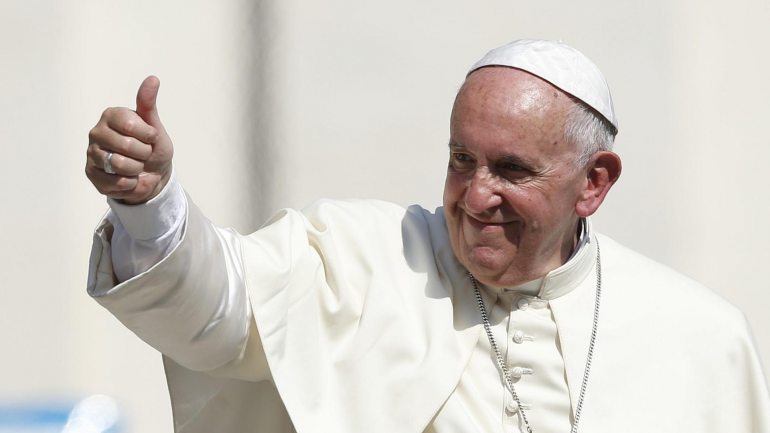Francis: A Pope of Small Things

"Francis went where few dared and championed the cause of the small, the unseen, and the vulnerable."
Preference for the neglected
Pope Francis, the 266th successor of St. Peter, left an indelible mark on the Church and the world. The presence of leaders from 130 nations at his funeral testifies to this fact. His 12-year pontificate, beginning in 2013, is remarkable for its reformations and the restoration of a Christlike vision of humanity. True to the motto he chose—"by having mercy and by choosing," he elevated those overlooked and unseen to positions of leadership. He dismantled the age-old notion that high offices were reserved only for the powerful in the Church hierarchy.
Canon law defines the laity as religious sisters, brothers, and married men and women. Historically, the ecclesiastical structure has placed them at the lower end, often keeping them at the periphery of Church governance. Yet Pope Francis — a pope from the peripheries himself — journeyed to those margins and entrusted the laity with key responsibilities once unthinkable.
Today, the Dicastery for Communication is led by a layperson, Dr. Paolo Ruffini, since July 5, 2018. Another dicastery, for Institutes of Consecrated Life and Societies of Apostolic Life, is headed by Sr. Simona Brambilla, MC, making her the first female prefect in the Vatican. A Salesian Cardinal, Ángel Fernández Artime, works under her leadership as Pro-Prefect — a radical reversal of former hierarchies. As of 2023, more than one in four employees of the Roman Curia — the group of bureaus that support the pope in governing the Church — are women.
On Holy Thursday last year, the pope broke with tradition by traveling to a female prison in Rome to wash the feet of 12 women prisoners. It was the first time a pontiff had washed only the feet of women in the annual ceremony that emphasizes humility.
Reform
Coming from the Society of Jesus — a religious order that was once suppressed in Church history — Pope Francis carried the spirit of resilience and reform into his governance of the Church. His reshuffling of the Roman Curia was one of the most significant in modern times. Of the 135 cardinals eligible to elect the next pope, 108 were created by him, ensuring that his vision of a humble, missionary, and inclusive Church would have the potential to continue.
When darkness loomed over the Church with scandals of corruption and abuse, Francis did not hide in silence. His document Vos Estis Lux Mundi (You are the Light of the World) set new norms to discipline offenders and serve justice, making clear that transparency and accountability were non-negotiable.
Defense of the Planet and the Poor
Pope Francis was outspoken on issues that many leaders hesitate to address. Global warming, ecological destruction, and the exploitation of the poor dominated his prophetic voice. His encyclical Laudato Si’ (2015) called the world to urgent action. He taught that caring for our common home is a moral obligation rooted in our faith.
Open Church
Pope Francis’ heart, as reflected in his apostolic letter Patris Corde ("With a Father’s Heart"), embraced both saints and sinners. In a church often criticized for its judgmental attitudes, he called for a “field hospital” approach — tending first to the wounds rather than insisting on perfection. Where the Church had sometimes appeared cold or distant, he restored the warmth of God’s mercy.
When the joy of family life seemed overshadowed by rigid regulations, his exhortation Amoris Laetitia ("The Joy of Love") offered hope and healing. Without diluting the Gospel, he softened hardened hearts with pastoral wisdom and understanding, encouraging inclusion over exclusion and accompaniment over condemnation.
Beyond Borders
Pope Francis truly lived out the spirit of the saint whose name he chose — St. Francis of Assisi, a friend of the poor, the marginalized, and all of creation.
He reached out to the most unlikely figures, bridging divisions wherever he could. In 2019, he kissed the feet of South Sudanese leaders, pleading for peace in the country. He met Vladimir Putin and Volodymyr Zelenskyy, the leaders of warring nations. Without hesitation, he urged the Russian Orthodox Patriarch to avoid becoming the Kremlin's pawn. He welcomed American presidents Joe Biden and Donald Trump, Brazilian leader Jair Bolsonaro, and Indian prime minister Narendra Modi — speaking truth to power while always offering the compassion of a father.
Francis went where few dared: into shelters for the homeless in Lampedusa, refugee camps in Lesbos, prisons near the Vatican, and war-torn regions in Iraq, Jordan, Israel, Palestine, the Central African Republic, and the United Arab Emirates. He became the voice of the voiceless — a living echo from the peripheries — whose resonance will be heard for generations to come.
As the conclave to choose his successor draws near, may the legacy of the late Pope inspire the cardinals to elect a pontiff who truly represents Christ’s heart.
Fr. Kampan Chinnam, a priest of the Diocese of Itanagar in Arunachal Pradesh, is currently the secretary for the Commission of Social Communication of the Northeast India Regional Bishops' Council. He contributes news to both national and international church news portals. He holds a master’s degree in journalism and mass communication.
Radio Veritas Asia (RVA), a media platform of the Catholic Church, aims to share Christ. RVA started in 1969 as a continental Catholic radio station to serve Asian countries in their respective local language, thus earning the tag “the Voice of Asian Christianity.” Responding to the emerging context, RVA embraced media platforms to connect with the global Asian audience via its 21 language websites and various social media platforms.













